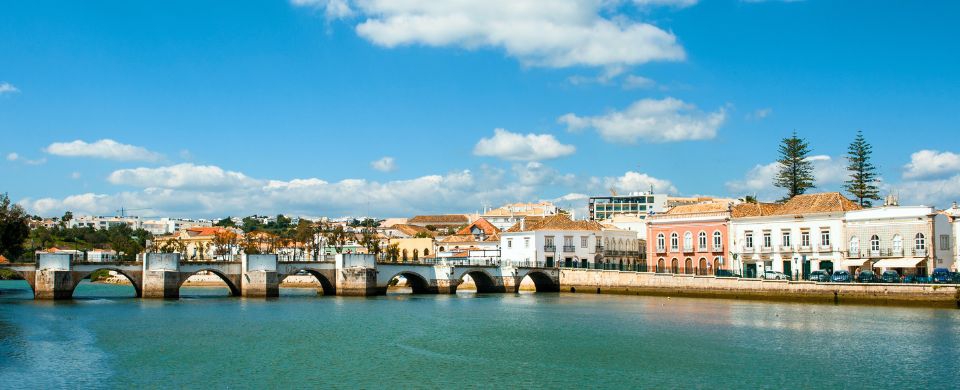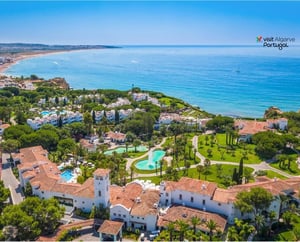Tax Facts to Know when Moving to the Algarve
expert insights by Blevins Franks
Book Top Experiences and Tours in Algarve:
If youʻre booking your trip to Algarve last minute, we have you covered. Below are some of the top tours and experiences!- Albufeira: Full-Day Buggy Tour with Lunch
- Faro: Ria Formosa Natural Park Segway Tour & Birdwatching
- From Faro: 4 Stops, 3 Islands in Ria Formosa Catamaran Tour
- Porches: Algarve Vineyard Tour and Wine Tasting Experience
- Albufeira: MiniGolf Adventure Park Entry Ticket
Many people are looking to move to Portugal to take advantage of some significant tax incentives, as well as the fabulous lifestyle. The first step should be to fully understand the tax and financial implications of moving, and to look for professional and expert advice for your particular circumstances.
Belvins Franks provides specialist cross-border tax and financial planning advice for UK expats across Europe. Their team in Portugal can help advise you on local Portuguese tax obligations as well as opportunities and can help steer you to an efficient tax and wealth management structure.
- Find out more about Blevins Franks
- See Blevins Franks free guide to Tax in Portugal 2023
Moving to Portugal?
The tax and wealth management essentials to know before you go
By Dan Henderson, Partner, Blevins Franks
Moving to Portugal proves very rewarding for many people, for a whole variety of reasons. While quality of life is the most important, Portugal can offer tax benefits too.
While it is never too late to review and adjust your financial planning for living in Portugal, if you are still planning your move it pays to do your research and take advice before you do. With early and careful planning, you can make the most of tax-efficient opportunities when moving to Portugal.
Residence post Brexit
Brexit may mean that there is more advance planning and paperwork involved, but most UK nationals can achieve their dream of living in Portugal, particularly if retired.
The D7 Passive Income Visa (D7 Visa) and D7 Passive Income Residency Permit (D7RP) are the most suitable routes for most individuals wishing to retire to Portugal. You will need to supply supporting documentation including a Portuguese tax identification number; proof of property purchase/rental agreement and of sufficient financial resources; suitable health insurance, and medical and criminal record checks.
The D7 Visa is valid for four months from the date of issue and allows you two entries into Portugal during that period. This enables you to arrange and attend an appointment in Portugal with the SEF (Serviço de Estrangeiros e Fronteiras – Portugal’s immigration service) to provide your documents and biometric data for the D7 Passive Income Residency Permit.
The D7RP is then valid for two years and renewable for a further three years by reconfirming the key qualifying criteria. After five years you may apply for Permanent Residency, valid for ten years. At each renewal you must prove you have not been absent from Portugal for six consecutive months or eight non-consecutive months in each of the previous years.
Portuguese income tax
While those qualified as ‘non habitual residents’ receive beneficial tax treatment (see below), all other tax residents of Portugal are liable to Portuguese tax on worldwide income. Certain capital gains are added to income whereas others are exempt or taxed at a fixed rate.
The 2023 income tax scale rates range from 14.5% for income under €7,479 to 48% for income over €78,834. A 2.5% or 5% solidarity tax is currently levied on income over €80,000 and €250,000 respectively.
Investment income (interest, shares, securities, bonds etc) is taxed at a flat rate of 28% (35% if held within a ‘tax haven’). You can opt for the scale rates if cheaper.
You are usually considered tax resident after 183 days in Portugal, but it can be earlier if you relocate with the intention of making it your home.
Portugal’s non-habitual residence regime – 10 years of tax advantages
New residents (i.e. you haven’t been resident in the last five years) can enjoy a decade of significant tax benefits by applying for Portugal’s ‘non-habitual residence’ (NHR) status.
Besides offering a fixed 20% income tax rate to those employed in ‘high value-added’ professions, NHR lets you receive some foreign income tax-free or at a reduced rate. You could also pay no Portuguese tax on gains from UK property.
Tax on UK pension income
Once you are tax resident in Portugal, your UK state and occupational pensions will only be liable for Portuguese income tax. UK government service pensions, however, remained taxed in the UK.
The taxation of personal pensions in Portugal gets complicated, so you need personalised, specialist advice. While some income can be taxed as investment income or at the favourable treatment applied to life assurance policies, most British expatriates are likely to pay tax at Portugal’s income tax scale rates.
There is no 25% tax free lump sum in Portugal, so you would be better off taking yours before you leave the UK.
If you qualify for NHR status, your UK pension income (excluding government service pensions) will be taxed at just 10%.
Portugal’s wealth tax on property
If you’re thinking of buying a luxury property, bear in mind that Portugal currently imposes a ‘wealth tax’ of sorts – Adicional Imposto Municipal Sobre Imóveis (AIMI) – on high-value local property, regardless of where the owner is resident.
You are only liable if your stake in Portuguese properties is over €600,000 (couples could get a €1,200,000 allowance for jointly held property) and then only on the value above that. Rates are 0.7% for individuals, 0.4% for companies and 1% for properties over €1 million. Some companies are not eligible for the allowance.
Portugal’s inheritance tax
Portugal has a very benign inheritance tax regime. The Portuguese version, called ‘stamp duty’, is only charged on assets located in Portugal and the tax rate is just 10%. Furthermore, spouses and ascendants/descendants are exempt.
Note that if you remain UK domiciled as many British expatriates do – domicile is a harder tie to break than residence – your worldwide estate remains subject to 40% UK inheritance tax (above the nil rate bands).
Timing your move to save tax
The Portuguese tax year runs from January to December, whereas the UK is April to April. The two countries apply different capital gains tax rules and rates.
It is therefore worth weighing up whether it is more tax efficient to sell your UK assets while still a UK resident, or wait till you are resident in Portugal, then time your move accordingly.
Minimising tax in Portugal
Don’t assume what was tax efficient in the UK is tax efficient elsewhere. UK ISAs, for example, are taxable in Portugal, but Portugal can provide its own tax planning opportunities, particularly on capital investments.
Many expatriates benefit from holding capital in a structure similar to an offshore life assurance policy or bond that acts as an investment wrapper to a conventional portfolio. No tax is payable on the underlying investment income until a withdrawal is made. Even then, only a proportion of the profit is taxable in Portugal and the effective rate of tax drops over time.
Portugal succession law imposes forced heirship
Unlike the UK, where you are free to leave your estate to whomever you choose, Portugal’s ‘forced heirship’ succession law dictates how assets are passed on. For Portuguese residents this means your spouse and direct family could automatically inherit at least half of your worldwide estate, even if you wish to pass wealth to other beneficiaries.
The Portuguese regime will apply by default, but you can opt for the EU ‘Brussels IV’ succession regulation to override it. Take professional advice first to establish what works best for your family and to achieve your wishes.
A helping hand
At Blevins Franks, we have decades of experience helping people move from the UK to Portugal and advising expatriates living there.
We can provide a strategic financial plan for the whole process, from your early planning stages in the UK, ensuring you do everything at the right time, through your retirement years in Portugal, and should you decide to return to the UK in the future. We’ll also be able to help your heirs through receiving their inheritance from you, should that time come.
We advise on how to apply for residence in Portugal and what all the tax implications will be. We review your savings and investments to ensure they’re suitable for you today and set up to be as tax efficient as possible, as well as effective from an estate planning point of view. We guide you through the local succession regime and help set up your estate to go to the right hands at the right time with as little tax as possible. And our regulated pensions specialists help you make the most of your retirement savings.
If you are thinking of moving to Portugal, get in touch with us today.
The tax rates, scope and reliefs may change. Any statements concerning taxation are based upon our understanding of current taxation laws and practices which are subject to change. Tax information has been summarised; an individual should take personalised advice.
Blevins Franks Wealth Management Limited (BFWML) is authorised and regulated by the Malta Financial Services Authority, registered number C 92917. Authorised to conduct investment services under the Investment Services Act and authorised to carry out insurance intermediary activities under the Insurance Distribution Act. Where advice is provided outside of Malta via the Insurance Distribution Directive or the Markets in Financial Instruments Directive II, the applicable regulatory system differs in some respects from that of Malta. BFWML also provides taxation advice; its tax advisers are fully qualified tax specialists. Blevins Franks Trustees Limited is authorised and regulated by the Malta Financial Services Authority for the administration of trusts, retirement schemes and companies. This promotion has been approved and issued by BFWML.
You can find other financial advisory articles by visiting our website here
This article was originally published by Blevins Franks.













































